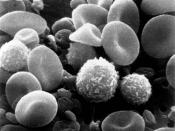Introduction.
Xenotransplantation has been recognized as one of the biggest medical advances ever, since it provides a way of donating organs from closely human related species to the patients with failure of vital organs. This is done by genetically engineering human organs in animals, which in itself in a scientific miracle. On the other hand; it has also been seen as cruelty to animals. Advances in science have made transfer of organs a very important issue. The increasing rates of vital organ failure and the very small supply of donated organs have made a wide gap between donated organs and organ demand, which means very long waiting times to receive organs as well as an increasing number of deaths while waiting. All of this has raised many moral issues regarding which patients are more deserving to be the next organ recipient. Organ and tissue transplantation can be more beneficial if everyone involved in the process, respect the best interests of the patients, as well as honor moral and religious values and don't seek personal fame or financial rewards.
Negatives:
One focus on xenotransplantation is the controversy of it. In the last hundred years, there have been many attempts to do animal-to-human organ transplants - all have failed. Pigs are now being genetically changed to carry human genes in the hope that these numerous failures can be turned into a medical treatment. Approximately 6,000 people are on the waiting lists for human organs from pigs, but obviously the procedure is far from perfected. Some viruses carried by pigs are impossible to treat. Experiments have shown that these viruses can infect humans, and there have been many instances of species infecting each other with catastrophic results - HIV and the chicken flu epidemic in Hong Kong are some examples. Not only does...


